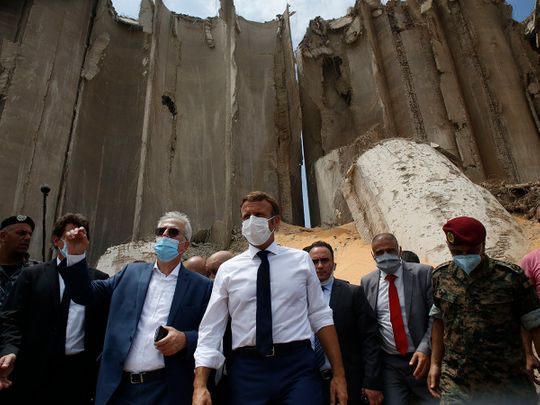
Abu Dhabi: “Long live France” came the chants, in French, from citizens of the Ashrafieh neighbourhood during French President Emmanuel Macron’s tour there on Thursday despite the end of the French mandate over Lebanon in 1943 and the withdrawal of the last soldier in 1946. But after more than 20 years of occupation, The the Lebanese are calling for a return of the French mandate as an affirmation of dissatisfaction with the current regime, according to the German News Agency.
The Lebanese have suffered greatly, and have overcome many tragedies before, from fierce battles by proxy to a catastrophic civil war that destroyed central Beirut. The people showed great stamina, but their patience is now exhausted, especially after the disaster of the Beirut Port blasts on Tuesday.
They welcomed Macron’s visit and as he stood in the midst of the crowd in Beirut he even pushed one of his guards aside in order to embrace a Lebanese woman. The Lebanese saw him as their “saviour.”
He initiated this visit, indifferent to the dangers, the least of which is the possibility of infection with the Coronavirus, among the crowds of people to express his solidarity and France’s solidarity with them.
Anger of the masses
They have not seen a Lebanese official standing in their midst and addressing them, and in fact no one, whoever was responsible, will not dare to do so. The anger of the Lebanese masses is stormy and its consequences cannot be predicted.
For instance, when the Lebanese Minister of Justice, Marie Claude Najm, tried to inspect the affected areas as a result of the explosion, angry protesters demanded her to resign, saying, “Do you have no dignity?!” While the protesters chased her, she tried to hide in one of the destroyed buildings until the army soldiers arrived to rescue her. The Lebanese President, Michel Aoun, only inspected the port.
Bloomberg News Agency says that the scenes of Macron’s tour, which were broadcast live by the media around the world, are expected to cause controversy in France, as he has been criticized from time to time for not responding to the French demands, and his popularity has barely begun to recover after the protests of the yellow vest activists.
During his tour, Macron was wearing a black tie to express grief for the victims of the devastating explosion in Beirut’s main port, which killed at least 137 people, injured thousands, and displaced 300,000 people. The damage is estimated at $5 billion, an amount that Lebanon does not possess now, according to Bloomberg.
International investigation
Speaking to reporters at the end of his visit, Macron called for an international investigation to be conducted to determine the causes of the explosion, which was reported to have been the result of the presence of a large shipment of “ammonium nitrate” in one of the port’s warehouses. “We need a transparent and frank international investigation to ensure that nothing is hidden or any doubts remain,” Macron said.
Macron tried to show his solidarity with the Lebanese people without standing by any political group. When one of the women shouted, “Please do not give the money to our corrupt government,” Macron looked at her and said, “Don’t worry about this.”
Macron promised that he would organize international aid while also pushing for political change. He said, “I came this morning to help, and I will talk with all political factions to demand a new charter.”
Macron refused to rule out sanctions against the Lebanese government, although he stressed that this was not a priority for the time being. He said Lebanese banks should disclose their losses to disburse international loans necessary to maintain food supplies.
On the other hand, Bloomberg reported that the French president’s visit to Lebanon shows his ambition to be a world leader in a region where the United States and Russia have maintained the balance of power in recent years, and Turkey is flexing its muscles.
Break out of the abyss
John Alterman, director of the Middle East programme at the American Center for Strategic Studies, said that under normal circumstances, the United States and its like allies and partners would come together to help Lebanon break out of the abyss in which it fell, and at the same time strike a blow against Iranian influence and help Lebanon not to become a failed state. There is insufficient evidence that the United States has the capacity or intent to organise such an effort now.
Alterman called on the administration of US President Donald Trump to hold in-depth discussions with France, the United Kingdom, and the Gulf states, saying that there should be tough discussions with Lebanese officials. These discussions and negotiations will take time and require skill, sympathy and understanding.
Alterman said that although it is not certain that the international parties will be able to take advantage of the current crisis to achieve the reforms that Lebanon needs, the chances are better if the United States plays a central role in these efforts, as the consequences of Lebanon’s failure could haunt Trump and his successors for years to come.








